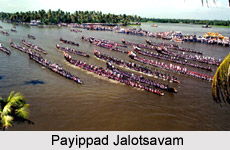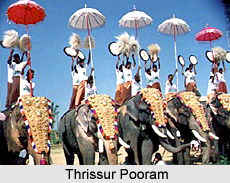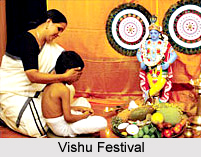
Music and dance forms an inherent part of the fairs and festivals of Kerala. Traditional festivals in Kerala continue to be as popular as in the ancient days. The most important of them are the week-long Onam celebrations which fall in the month of Chingam (August-September), the first month of Kerala`s New Year. Apart from that there are other festivals too like Vishu, Thiruvathira, and Thrissur Pooram that reflects the diverse culture of the state.
Important festivals of Kerala
Kerala celebrate both regional and national festivals with full grandeur. Besides giving a glimpse of the cultural and religious heritage of the state these festivals also reflect communal unity of different people in the region.
Onam
In Kerala, Onam festival is observed in the honour of the legendary King Mahabali and marks the beginning of a new year. Flower carpets deck the entry of every household. Also a gala feast and cultural performances are colligated with the festival. The most spectacular aspect of the celebrations of Onam is the boat race.
Sabarimala Temple Festival
The Sabarimala Temple Festival is held at the Ayyappa Temple at Sabarimala in the Western Ghats of Kerala. The most vital day of this festival is the Makkara Vilakku day. It is believed that on that day a light on a neighbouring hill confirms the arrival of the deity.
Thrissur Pooram
Among temple festivals, Thrissur Pooram, held at Thrissur is the most famous. Dance, merriment, playing with fireworks - all heightens the momentum of the festival to a great extent.
Vishu
Another significant festival of Kerala is Vishu festival, which is celebrated in April-May when the rains are about to commence. This festival has several rituals associated with it. According to the Malayalam tradition the morning of this day is considered to be very propitious, as it is believed that prosperity prevails throughout the year if one views good things at that particular hour. A great feast at home is an integral part of celebrating this festival. Gifts are also exchanged.
 Tiruvatira
Tiruvatira
Tiruvatira, which falls in December-January, is a significant festival for women, especially maidens. On this occasion, women sing songs and make merry by splashing water on one another. The bath continues till the day breaks. Then they return to their houses and put on fine garments. The whole day is spent in relaxation. Folk-dances are also an important aspect of the celebration of this festival. The elephant procession and fireworks in the Thrissur temple and the procession in Thiruvananthapuram where the holy idol is immersed in the sea are also fascinating festivals.
Vallam Kali
Vallam Kali, which literally means boat game or boat race, is held during the monsoon season when the backwaters are full. The race is not just a test to the speed but also about skill and endurance. The participants practice for days to take part in the race. These boat races are a major crowd puller.
Theyyam Festival
Theyyam is one of the popular festivals in North Malabar of Kerala, mainly in the area of Kolathunadu, which includes present day Koyilandy Vadakara Taluka in Kozhikode and Mananthavady Taluk in Wayanad. This 800-year old festival is celebrated between December and April. It is a form of worship and it showcases art and fold dance. There are over 400 different types of Theyyam dances.
Kodungallur Bharani Utsavam
Kodungallur Bharani Utsavam or Kodungallur Bharani is one of the most exotic festivals in Kerala. The festival usually falls during the Malayalam month of Meenam or the period between the month of March and April. Surrounded by trees, the Kodungallur Bhagawati temple has a seven feet tall idol of Bhadrakali. The festival begins with the arrival of the local king, who is considered to be the temple"s keeper. After the king arrives at the temple, he raises the sacred, red silk umbrella as a sign to start the festival.
Attukal Pongala
Attukal Pongala is celebrated in the Attukal Bhagavathy Temple, which is located in Attukal, Thiruvananthapuram. This festival brings together women from all religion and caste. The festival holds the Guinness Record for hosting the largest congregation of female annually.
Christmas
With Christians accounting for more than a quarter of the total population of Kerala, Christmas is one of the most popular festivals of this state. The celebration is a fusion of local, Western and Syrian tradition.
Thaipooyam Mahotsavam Festival
Thaipooyam Mahotsavam pulls in with the pulsating beats of the chenda or drums while the cymbals punctuate every movement of the dancing devotees bearing the kavadis. All present seem possessed by a divine spirit that helps them shed their earthly burdens and revel in an otherworldly bliss.
 Koodalmanikyam Festival
Koodalmanikyam Festival
Koodalmanikyam Festival is held at the Koodalmanikyam temple in Thrissur. The temple is dedicated to Lord Bharatha, the brother of Lord Rama in the epic Ramayana. The colourful eleven-day annual festival at the Koodalmanikyam temple is noted for the grand elephant pageantry. The festival falls in during April or May.
Chandanakkudam
Held at the Kanjiramattom Mosque, in Ernakualm District of Kerala, the ritual of Chandanakkudam is organised during January at the mosque, which is a memorial to Sheikh Fariduddin, a revered Muslim mystic. The festival involves a procession of hundreds of pilgrims carrying earthen pots, smeared with sandal paste and filled with coins.
Edappally Perunnal
Edappally Perunnal or St George feast is the annual festival celebrated in St.George`s Forane Church in Edappally in Ernakulum District which is one of the oldest Roman Catholic Church in Kerala. The festival is celebrated on 23rd of April and begins with a high mass.



















